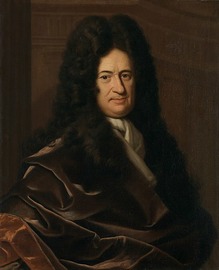en.wikipedia.org
Always private
DuckDuckGo never tracks your searches.
Learn MoreYou can hide this reminder in Search Settings
All regions
Argentina
Australia
Austria
Belgium (fr)
Belgium (nl)
Brazil
Bulgaria
Canada (en)
Canada (fr)
Catalonia
Chile
China
Colombia
Croatia
Czech Republic
Denmark
Estonia
Finland
France
Germany
Greece
Hong Kong
Hungary
Iceland
India (en)
Indonesia (en)
Ireland
Israel (en)
Italy
Japan
Korea
Latvia
Lithuania
Malaysia (en)
Mexico
Netherlands
New Zealand
Norway
Pakistan (en)
Peru
Philippines (en)
Poland
Portugal
Romania
Russia
Saudi Arabia
Singapore
Slovakia
Slovenia
South Africa
Spain (ca)
Spain (es)
Sweden
Switzerland (de)
Switzerland (fr)
Taiwan
Thailand (en)
Turkey
Ukraine
United Kingdom
US (English)
US (Spanish)
Vietnam (en)
Safe search: moderate
Strict
Moderate
Off
Any time
- Was this helpful?
- Gottfried Wilhelm Leibniz (or Leibnitz; [a] 1 July 1646 [O.S. 21 June] - 14 November 1716) was a German polymath active as a mathematician, philosopher, scientist and diplomat who is credited, alongside Sir Isaac Newton, with the creation of calculus in addition to many other branches of mathematics, such as binary arithmetic and statistics.Leibniz has been called the "last universal genius ...
britannica.com
Nov 13, 2024Gottfried Wilhelm Leibniz (born June 21 [July 1, New Style], 1646, Leipzig [Germany]—died November 14, 1716, Hanover [Germany]) was a German philosopher, mathematician, and political adviser, important both as a metaphysician and as a logician and distinguished also for his independent invention of the differential and integral calculus.plato.stanford.edu
Stanford Encyclopedia of Philosophy
https://plato.stanford.edu › entries › leibniz
Gottfried Wilhelm Leibniz (1646-1716) was one of the great thinkers of the seventeenth and eighteenth centuries and is known as the last "universal genius". He made deep and important contributions to the fields of metaphysics, epistemology, logic, philosophy of religion, as well as mathematics, physics, geology, jurisprudence, and ...worldhistory.org
World History Encyclopedia
https://www.worldhistory.org › Gottfried_Wilhelm_Leibniz
Jan 26, 2024Gottfried Wilhelm Leibniz (1646-1716) was a German polymath who became well-known across Europe for his work, particularly in the fields of science, mathematics, and philosophy.Leibniz's rationalist philosophy attempted to reconcile traditional religious beliefs with the new discoveries of the Scientific Revolution, and his work was influential on later thinkers during the Enlightenment.iep.utm.edu
Internet Encyclopedia of Philosophy
https://iep.utm.edu › leib-ove
Gottfried Wilhelm Leibniz (1646-1716) Widely hailed as a universal genius, Gottfried Wilhelm Leibniz was one of the most important thinkers of the late 17 th and early 18 th centuries. A polymath and one of the founders of calculus, Leibniz is best known philosophically for his metaphysical idealism; his theory that reality is composed of spiritual, non-interacting "monads," and his oft ...mathshistory.st-andrews.ac.uk
MacTutor History of Mathematics Archive
https://mathshistory.st-andrews.ac.uk › Biographies › Leibniz
H Hecht, Gottfried Wilhelm Leibniz : Mathematik und Naturwissenschaften im Paradigma der Metaphysik, Teubner-Archiv zur Mathematik (Stuttgart, 1992). J E Hofmann, Leibniz in Paris, 1672-1676 (Cambridge, 1974). K Hüber, Leibniz (German), Verlag von R. Oldenbourg (München, 1951).historytools.org
Mar 29, 2024Gottfried Wilhelm Leibniz was born into an academic family in Leipzig, Germany on July 1, 1646. From a very early age, he displayed an insatiable curiosity and stunning intellect. By the age of 12, Leibniz had taught himself Latin and was already devouring advanced works of philosophy and science in his father's library.britannica.com
Gottfried Wilhelm Leibniz, Freiherr von Leibniz, (born July 1, 1646, Leipzig, Saxony—died Nov. 14, 1716, Hannover, Hanover), German philosopher, mathematician, inventor, jurist, historian, diplomat, and political adviser.He obtained a doctorate in law at age 20. In 1667 he began working for the elector of Mainz, in which position he codified the laws of the city, among other important tasks.mally.stanford.edu
The Metaphysics Research Lab
https://mally.stanford.edu › leibniz.html
Gottfried Wilhelm Leibniz (b. 1646, d. 1716) was a German philosopher, mathematician, and logician who is probably most well known for having invented the differential and integral calculus (independently of Sir Isaac Newton). In his correspondence with the leading intellectual and political figures of his era, he discussed mathematics, logic ...en.wikipedia.org
Gottfried Wilhelm (von) Leibniz (1 July 1646 [O.S. 21 June] - 14 November 1716); German polymath, philosopher logician, mathematician. [1] Developed differential and integral calculus at about the same time and independently of Isaac Newton. Leibniz earned his keep as a lawyer, diplomat, librarian, and genealogist for the House of Hanover ...Can’t find what you’re looking for?
Help us improve DuckDuckGo searches with your feedback
